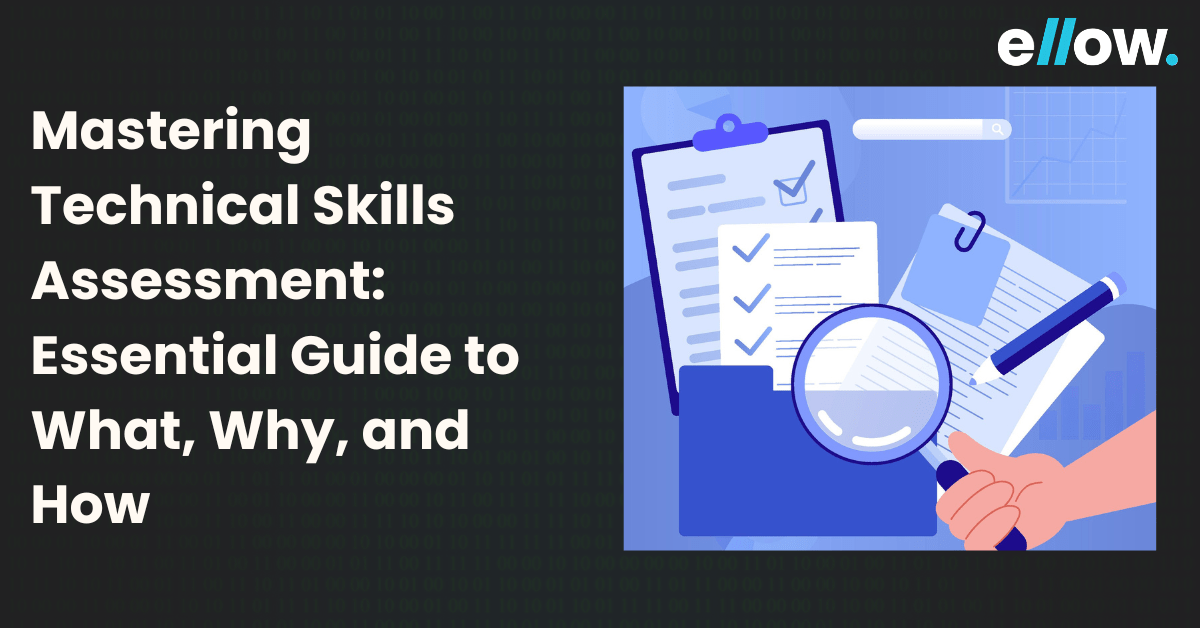In today’s fast-paced and technology-driven world, the demand for skilled professionals has never been higher. According to a recent survey by ManpowerGroup, 77% of employers reported difficulty finding qualified talent, highlighting the growing skills gap in the job market. To bridge this gap, companies are increasingly relying on technical skills assessments to identify the right candidates. These assessments play a crucial role in the hiring process by evaluating candidates’ practical abilities and ensuring they possess the necessary skills to succeed. In this article, we will explore what technical skills assessments are, why they are important, and how to implement them effectively.
What is a Technical Skills Assessment?
A technical skills assessment is a method used by employers to evaluate a candidate’s ability to perform specific tasks or demonstrate certain competencies relevant to a job role. Unlike traditional interviews that focus on behavioral or situational questions, technical assessments are designed to test a candidate’s hands-on skills in areas such as coding, problem-solving, software development, and other technical disciplines.
There are various types of technical skills assessments, each tailored to assess different skills. For instance, coding tests are commonly used for software development roles, while practical assignments or project-based assessments may be used for roles that require hands-on experience with specific tools or technologies.
Purpose of Technical Skills Assessments
The primary purpose of technical skills assessments is to ensure that candidates possess the technical expertise required for a specific role. These assessments help employers verify a candidate’s abilities, reducing the risk of hiring individuals who may not be able to perform the job effectively.
Common skills assessed in technical tests include coding proficiency, problem-solving abilities, understanding of algorithms and data structures, and knowledge of specific programming languages or tools. By assessing these skills, employers can make more informed hiring decisions and ensure that they select candidates who are well-suited for the job.
Why are Technical Skills Assessments Important?
Importance for Employers
For employers, technical skills assessments offer several advantages. Firstly, they provide a clear and objective measure of a candidate’s abilities. Instead of relying solely on resumes or interviews, which can sometimes be misleading, technical assessments offer a practical demonstration of a candidate’s skills. This reduces the chances of making hiring mistakes and ensures that the candidate can handle the technical demands of the job.
Secondly, technical skills assessments help in reducing hiring risks. By validating a candidate’s skills before making a job offer, employers can avoid the costly mistake of hiring someone who may not be able to perform the role effectively. This not only saves time and resources but also contributes to building a stronger, more capable workforce.
Additionally, technical assessments contribute to improving the quality of hires. By focusing on candidates who have demonstrated their abilities through assessments, employers can build teams that are better equipped to tackle the challenges of their roles, leading to increased productivity and better overall performance.
Importance for Candidates
For candidates, technical skills assessments offer an opportunity to showcase their real-world skills. Instead of relying solely on academic qualifications or work experience, candidates can demonstrate their abilities in a practical context, highlighting their suitability for the role.
These assessments also help candidates understand the job expectations more clearly. By participating in a technical assessment, candidates can get a sense of the type of work they will be expected to perform if hired, allowing them to assess whether the role is a good fit for their skills and interests.
Furthermore, technical skills assessments contribute to a fairer selection process. Since these assessments focus on practical abilities rather than subjective factors, candidates have an equal opportunity to demonstrate their skills, regardless of their background or experience level.
How to Implement Technical Skills Assessments?
Steps for Employers
Identifying the Skills to be Assessed
The first step in implementing technical skills assessments is to identify the key skills that need to be assessed for a specific role. Employers should analyze the job requirements and determine which technical competencies are most critical for success in the position.
Choosing the Right Tools and Platforms
Once the skills have been identified, the next step is to choose the appropriate tools and platforms for conducting the assessments. There are several platforms available that offer a range of assessment options, including coding challenges, project-based assignments, and multiple-choice tests. Popular platforms include HackerRank, Codility, and LeetCode, which are widely used for technical skills assessments.
Creating Effective Assessment Criteria and Formats
To ensure that the assessments are effective, employers should create clear and well-defined criteria for evaluating candidates. This includes specifying the technical skills that will be assessed, the level of proficiency required, and the format of the assessment. For example, a coding test might require candidates to solve specific programming challenges within a set time frame, while a project-based assessment might involve completing a task or project that simulates real-world scenarios.
Integrating Assessments into the Hiring Process
Finally, technical skills assessments should be seamlessly integrated into the overall hiring process. This may involve scheduling assessments after an initial screening interview or as part of a multi-stage interview process. Employers should also communicate the purpose and format of the assessment to candidates in advance, ensuring that they understand what is expected of them.
Tips for Candidates
Preparing for Technical Skills Assessments
For candidates, preparation is key to performing well in technical skills assessments. This involves practicing regularly with sample tests and familiarizing themselves with the types of challenges they are likely to encounter. There are several online resources and platforms where candidates can practice coding challenges and technical problems, helping them build their confidence and improve their skills.
Common Mistakes to Avoid
During technical assessments, candidates should be mindful of common mistakes, such as misinterpreting the problem statement or overlooking important details. It’s important to read the instructions carefully and plan a solution before starting to code or solve the problem.
Showcasing Problem-Solving Skills
In addition to technical proficiency, candidates should focus on showcasing their problem-solving abilities during the assessment. This involves breaking down complex problems into manageable steps, demonstrating a clear thought process, and writing clean, efficient code.
Common Tools and Platforms for Technical Skills Assessment
There are several platforms available that offer technical skills assessments, each with its own set of features and capabilities. Some of the most popular platforms include:
- HackerRank: Known for its extensive library of coding challenges and assessments, HackerRank is widely used by companies to evaluate candidates’ coding skills in various programming languages.
- Codility: Codility offers a range of coding assessments, including real-world coding tasks and project-based assignments. It is popular among companies that require candidates to demonstrate their practical coding abilities.
- LeetCode: LeetCode is a platform that offers a large collection of coding challenges, ranging from easy to difficult. It is commonly used by candidates to prepare for technical interviews and assessments.
Choosing the Right Platform
When selecting a platform for technical skills assessment, employers should consider several factors, including the type of assessments offered, the ease of use, and the level of customization available. Additionally, employers should choose a platform that aligns with their specific assessment needs, whether it’s coding challenges, project-based tasks, or other technical assessments.
Best Practices for Technical Skills Assessment
For Employers
Designing Fair and Unbiased Assessments
To ensure that technical skills assessments are fair and unbiased, employers should focus on creating assessments that are relevant to the job role and free from any potential biases. This includes using objective criteria for evaluation and avoiding any factors that could unfairly disadvantage certain candidates.
Providing Clear Instructions and Expectations
Clear communication is key to a successful assessment process. Employers should provide candidates with detailed instructions on what to expect during the assessment, including the format, time limits, and evaluation criteria. This helps candidates feel more confident and prepared, leading to better performance.
Ensuring a Smooth Candidate Experience
The candidate’s experience is an important consideration when implementing technical skills assessments. Employers should ensure that the assessment process is straightforward and user-friendly, with minimal technical issues or disruptions. Providing support and resources to candidates can also help them feel more at ease during the assessment.
For Candidates
Practicing Regularly with Sample Tests
Regular practice is essential for candidates preparing for technical skills assessments. By working through sample tests and coding challenges, candidates can build their skills and become more comfortable with the types of problems they will encounter during the assessment.
Understanding the Job Role and Its Technical Requirements
Before taking a technical assessment, candidates should take the time to thoroughly understand the job role and the specific technical skills required. This will help them tailor their preparation and focus on the areas that are most relevant to the job.
Approaching the Assessment with a Problem-Solving Mindset
During the assessment, candidates should approach each task with a problem-solving mindset. This involves breaking down complex problems into smaller, more manageable steps, thinking critically about the best solution, and demonstrating a clear and logical thought process.
Conclusion
Technical skills assessments have become an essential tool in the hiring process, offering both employers and candidates a practical and objective way to evaluate technical abilities. By understanding what these assessments are, why they are important, and how to implement them effectively, companies can improve the quality of their hires and build stronger, more capable teams. For candidates, technical assessments offer a valuable opportunity to showcase their skills and stand out in a competitive job market. By following best practices and preparing thoroughly, candidates can approach technical skills assessments with confidence and succeed in demonstrating their abilities.
FAQs
1. What are technical skills assessments?
Technical skills assessments are evaluations used by employers to measure a candidate's practical abilities in specific technical areas, such as coding, problem-solving, or software development. These assessments can take various forms, including coding tests, project-based tasks, and multiple-choice questions, depending on the skills required for the job.
2. Why do employers use technical skills assessments?
Employers use technical skills assessments to verify that candidates have the necessary skills to perform effectively in a specific role. These assessments help reduce hiring risks by providing a clear, objective measure of a candidate's abilities, ensuring that the best candidates are selected for the job.
3. How can candidates prepare for technical skills assessments?
Candidates can prepare for technical skills assessments by practicing regularly with sample tests and coding challenges. Understanding the job role and its technical requirements is also important, as it allows candidates to focus their preparation on the most relevant skills. Additionally, candidates should approach the assessment with a problem-solving mindset and avoid common mistakes, such as misinterpreting instructions.
4. What platforms are commonly used for technical skills assessments?
Some of the most popular platforms for technical skills assessments include HackerRank, Codility, and LeetCode. These platforms offer a variety of assessment options, from coding challenges to project-based tasks, and are widely used by employers to evaluate candidates' technical abilities.
5. How can employers ensure fairness in technical skills assessments?
To ensure fairness in technical skills assessments, employers should design assessments that are relevant to the job role and free from biases. This includes using objective criteria for evaluation, providing clear instructions and expectations to candidates, and ensuring a smooth and user-friendly assessment process.






